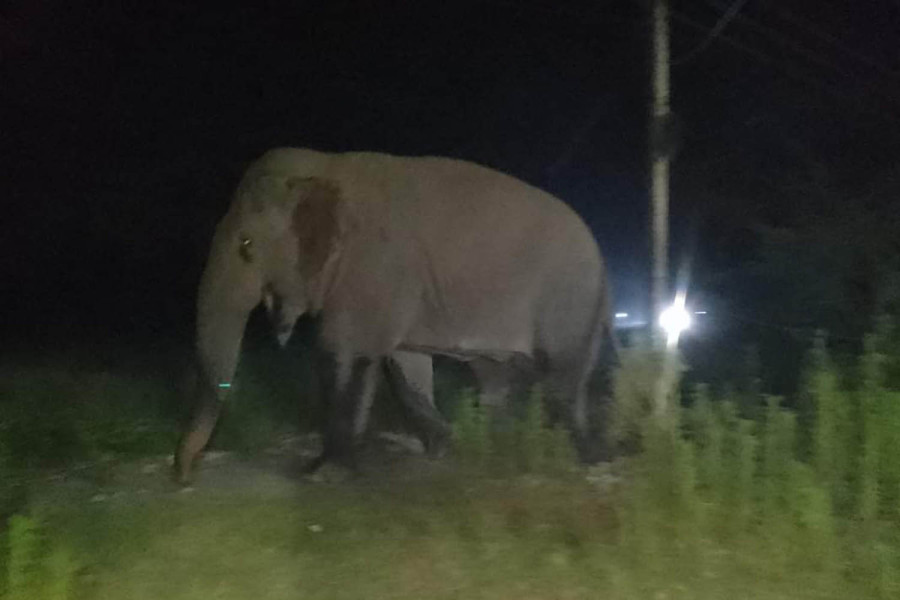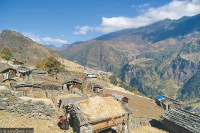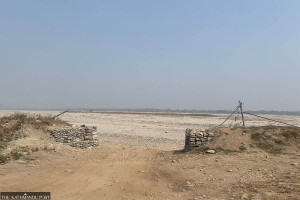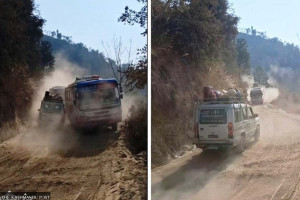Koshi Province
Elephant menace continues unabated in eastern Tarai districts
Three people were killed by the animals over the past two weeks in Jhapa and Sunsari.
Binod Bhandari
Wild elephants have continued wreaking havoc in eastern Tarai districts of Jhapa, Sunsari and Morang. Three people were killed by the tuskers over the past two weeks while crops planted in hectares of land were damaged and houses were dismantled in the area.
A forest watchman of Ranakali Community Forest in Hardibari Rural Municipality-3 of Jhapa was killed by a marauding wild elephant. The tuskers entering Haldibari settlement attacked 40-year-old Dhan Bahadur Ban. The victim died on the spot, said police.
On Thursday, Rabin Khadka of Itahari Sub-Metropolitan City-2 in Sunsari died in a wild elephant attack. According to Superintendent of Police in Sunsari Nabin Singh Bhandari, the tusker attacked Khadka, aged 25, while the villagers attempted to chase away wild elephants from entering the settlement.
Meanwhile, two weeks ago, another man, Padamlal Tamang, had died in an attack of wild elephants at Hamsedumse Community Forest in Damak Municipality-3, Jhapa. The elephant attacked the victim while he was in the forest to collect firewood. Deceased Tamang was a Bhutanese refugee who stayed in sector B2 hut No 252 of Bhutanese Refugee Camp in Beldangi.
As per the data available at the District Police Office in Jhapa, as many as six people were killed by wild elephants in Jhapa alone in the last fiscal year of 2022-23. Likewise, two people from Sundar Haraicha Municipality of Morang died the same year.
Morang does not have human casualties by wild elephants as of now in the current fiscal year of 2023-24, said Bishnu Ghimire, chief at the Division Forest Office in Morang. “However, the herds of elephants uprooted houses and damaged crops planted in hectares of land,” he said. According to him, the elephants that entered Morang from Humsedumse forest of Jhapa have been terrorising locals in Jante, Letang, Miklajung, Kerabari, and Sundar Haraicha, among other places, in Morang now.
Every year, wild elephants from India enter Nepal through Bahundangi of Jhapa. According to conservationists, Bahundangi and its surrounding areas are the corridor for elephant movement. Studies show that elephants from Assam and West Bengal in India travel up to Koshi Tappu Wildlife Reserve in Nepal through Bahundangi.
Experts say that instances of human-wildlife conflict are recurring because of the encroachment of the bio-corridor by humans over the years. “The elephants enter human settlements as they do not find enough food in the forests. They eat crops in the fields and even food grains stored in the house,” said Ghimire.
According to Ghimire, more than 30 wild elephants are roaming around in Jante, Letang, Miklajung, Kerabari, Sundar Haraicha currently. Wards 6, 7 and 8 of Miklajung Rural Municipality that borders Jhapa district are the most affected by the elephant menace. Kaseni, Khamejhoda, Katale and Betani settlements of Miklajung-6; Mawadagi of Miklajung-7; and Mawa Toribari of Miklajung-8 are the hardest hit by the elephants.
“People generally prepare to go to bed after having evening meals. But we locals in Miklajung have to patrol the areas with flaming torches on hand,” said Kishor Niraula, a local of Kaseni in Miklajung. “We haven’t been able to sleep for the past three months as we have to remain vigilant to keep the elephants away.”




 9.7°C Kathmandu
9.7°C Kathmandu












